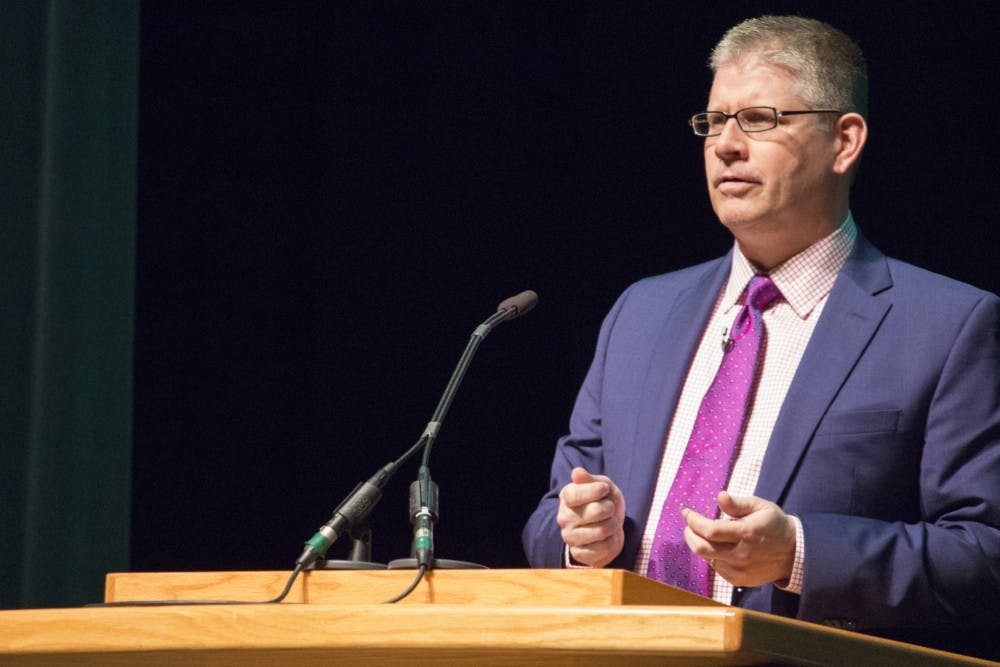After postponing his lecture in October, ESPN anchor John Anderson made his arrival at Emens Auditorium as part of the David Letterman Lecture series Thursday.
Anderson began the lecture with stories of connection to the university. He showed the audience he wanted to be at October's intended presentation from a screenshot of a text exchange, with a picture of Anderson going into surgery, saying “I'd rather be in Muncie.”
Anderson also gave a shout out to David Letterman with a flashback photo from his college years in which he was dressed up as Letterman for Halloween.
While Anderson took a humorous approach to his speech, he put a strong emphasis on the importance of word usage and how powerful words can be.
“Words have become an endangered species,” Anderson said. “The world and words are becoming more and more simplified. The matter at hand does not make me LOL.”
Anderson expressed the importance of writing throughout the transformation of media and said it will always translate — whether that be on paper or on a screen.
Anderson also brought up how his writing benefited him in the workplace.
“The better I write, the less I have to talk," he said.
Anderson emphasized the importance of words in the field of journalism as well.
“Journalism is based on words,” he said. “Do not abuse them.”
Audience member Alicia Barnachea found his focus on word choice to be a valuable topic.
“Word choice and grammar are the basic fundamentals of journalism,” said Barnachea, a junior journalism and telecommunications major. “When you get down to it, that’s what really, truly matters in the long run.”
In addition to journalism talk, Anderson spoke about how individuals should write in their leisure time, using such examples as writing a letter and seeing what the reaction will be from the recipient.
Anderson concluded his lecture by informing the audience on how much their engagement matters to the success of ESPN.
According to Anderson, 64 percent of ESPN’s revenue is made from subscriptions to the network.
He also talked about how the network has revolutionized the world of sports broadcasting.
“ESPN really excels at taking worthless events and making money off of them,” Anderson said. “No one really expressed interest in the first and second rounds of the NCAA Basketball tournament or the NFL Draft until we started broadcasting them."
After the lecture, Anderson took questions from the audience.
While most of the questions were on the lighter side, more serious questions were brought to light, including the future of print media.
“I don’t know how editors and publishers plan to solve that, because this has become a practical reality,” Anderson said. “This problem has come over to TV as well in cord cutting. It is a problem, I hope there will always be a place for papers, but there may not be in the future as times are changing.”
Those in attendance who are from a similar field as Anderson picked up some valuable lessons from the lecture.
“I thought the event was really insightful,” said junior telecommunications major Jack Salzman. “He provided a really effective way for students to really learn how to tell stories from somebody who has such a prominent job.”
Some of the audience members who asked questions believed Anderson really taught them some valuable lessons.
“I feel like he really pointed out to me that no question is really dumb,” Barnachea said. “I always feel like I ask dumb questions and I really can’t wait to learn more about that in his upcoming lecture.”
The College of Communication and Media held an interviewing workshop to a select few students Friday morning.
Overall, Anderson’s lecture seemed to have a positive response from the audience. According to Salzman, the connection Anderson made was what made the talk great.
“He could’ve talked about all the stuff he has done with SportsCenter, but he really made it about the steps to take to [get to] where he is at right now," Salzman said.





